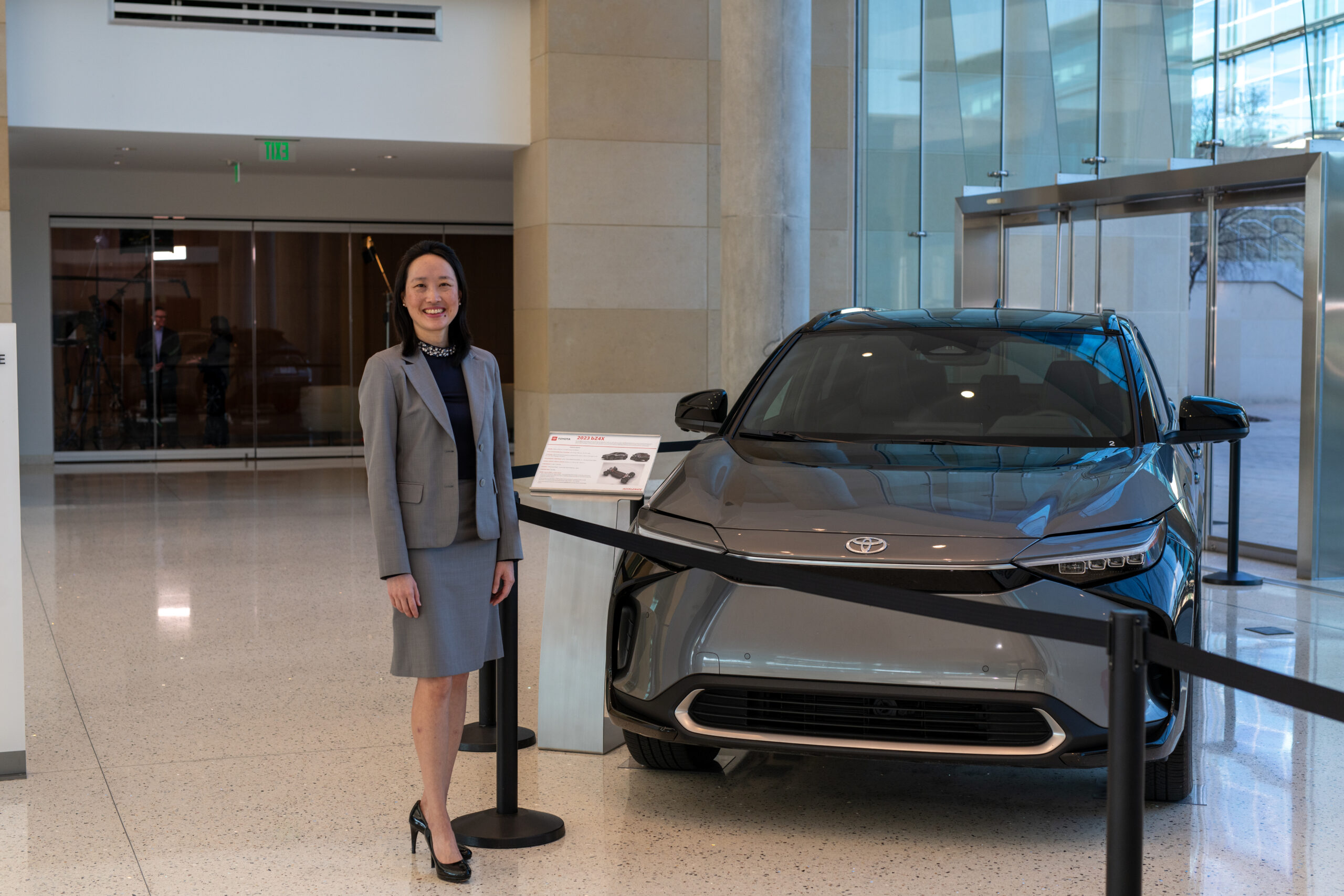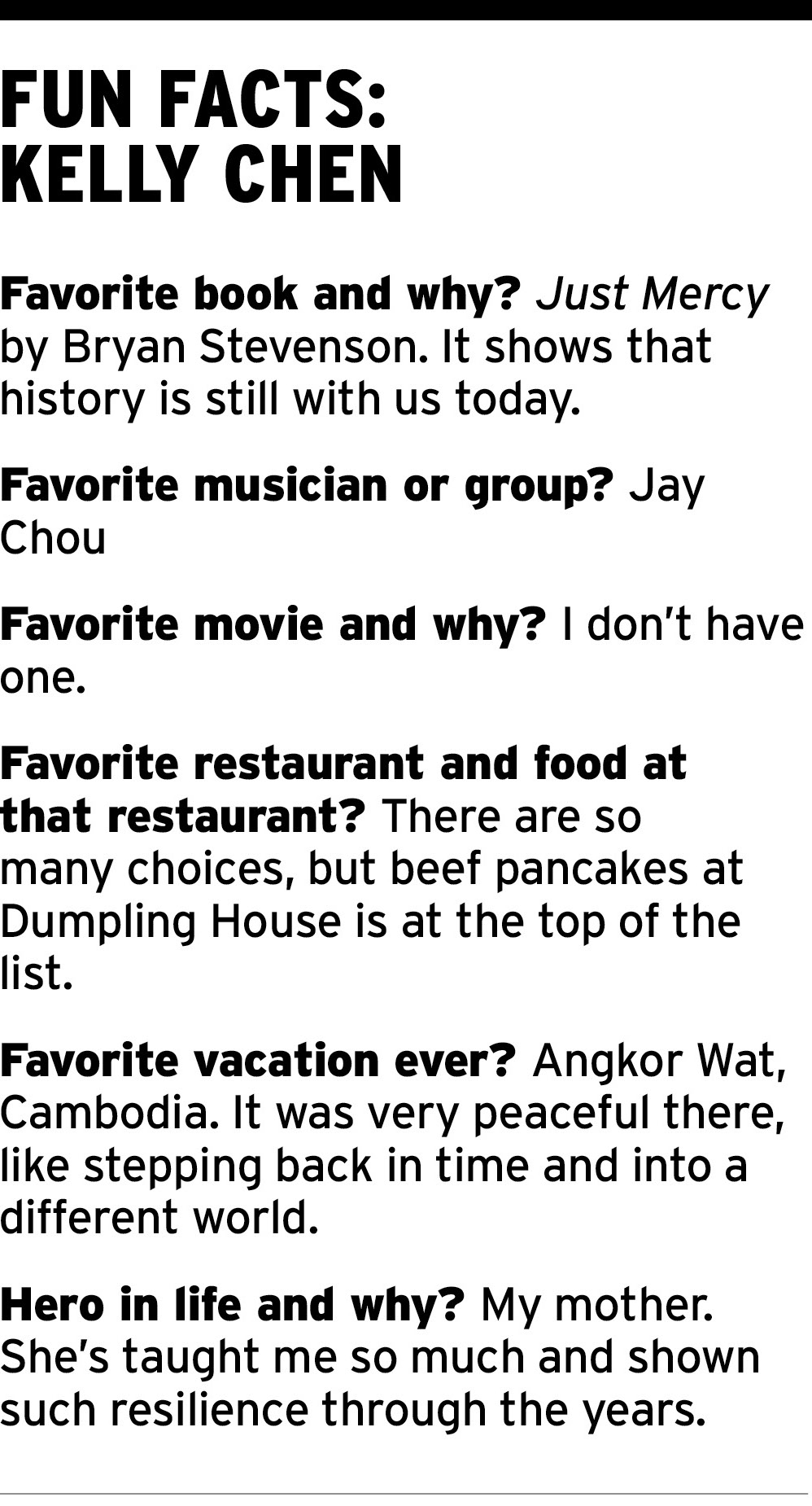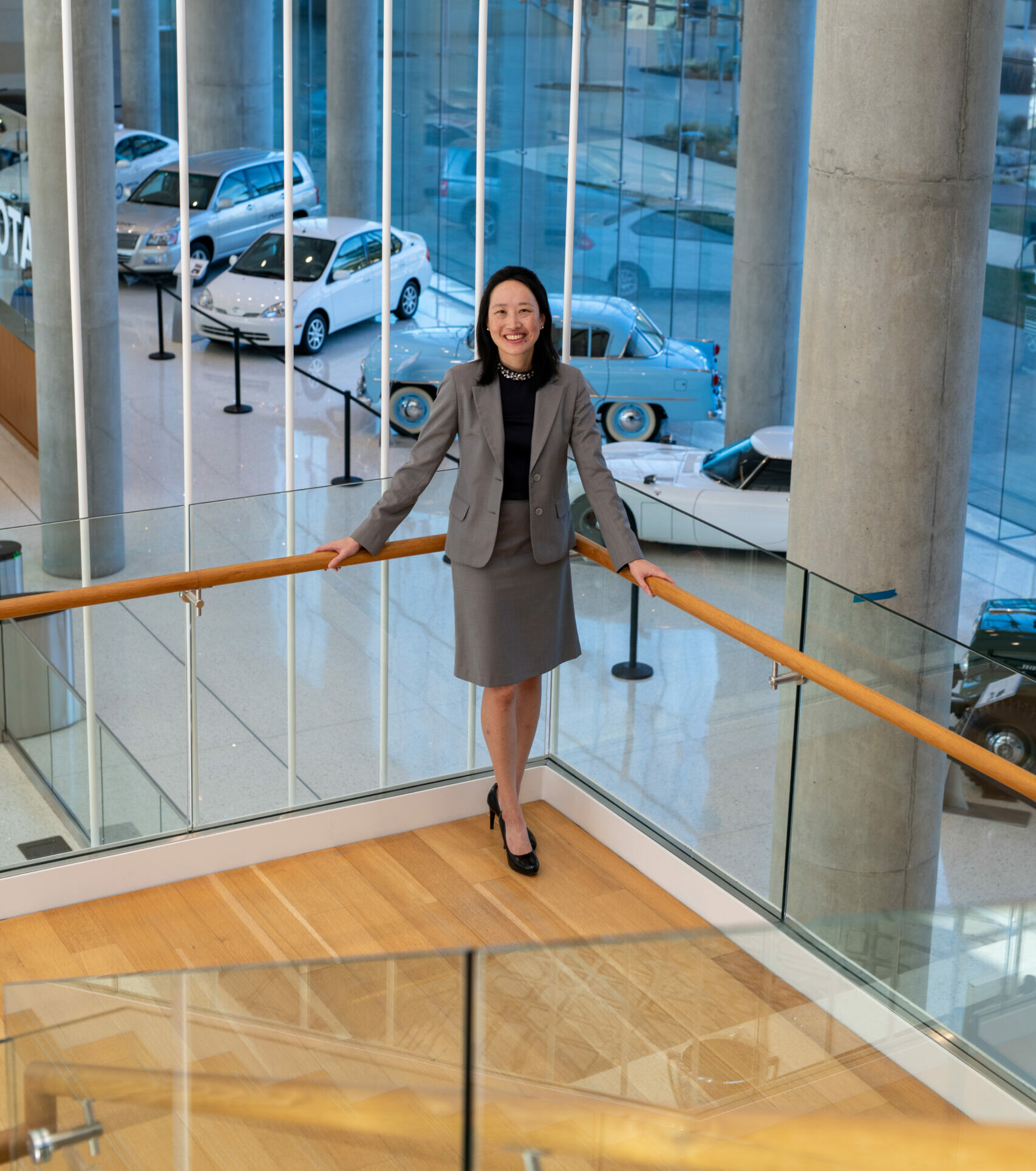
(Editor’s Note: This article has been updated to include comments from a law student mentored by Chen).
Two decades ago, while enrolled in Southern Methodist University’s Dedman School of Law, Kelly Chen also worked full-time as a certified public accountant in Deloitte’s tax section. She would work all day — during tax season, sometimes arriving at the office at 5 a.m. — and then attend class at SMU Dedman’s night law school program.
Now managing counsel of business litigation at Toyota Motor North America, Chen applies that same relentless work ethic to the patent infringement and class action matters she oversees and to diversity, equity and inclusion efforts — within the company and on her own time.
Before going in-house in 2020, Chen had already displayed her commitment to DEI by serving as a board member and leader at various organizations: nonprofit Heart House, the National Asian Pacific American Bar Association and the Dallas Asian American Bar Association.
Once she joined Toyota’s legal department, Chen took her commitment a step further — joining the department’s diversity committee, joining the steering committee of the Texas Minority Counsel Program, mentoring Toyota interns in the Diverse Attorney Pipeline Program, staying in regular communication with Toyota’s outside law firms about diversity issues and hosting educational webinars for them. She’s also mentored a number of SMU Dedman law students.
One of Chen’s most impactful DEI successes recently occurred when she led Toyota Legal One’s think tank program that brought together senior leaders from the company’s partnering firms to brainstorm innovative solutions for improving diversity at law firms. Chen helped foster discussion around the winning idea of reforming the approach to an associate’s first-ever assignment with the goal of removing bias and setting young diverse lawyers up for success.
“That first assignment that an associate gets when they enter a firm … can have a very big impact on their career path, whether you realize it or not,” Chen said. “That first foundational moment is really what we should be focusing on to really help make sure that our associates are successful.”
The Texas Lawbook and the Dallas-Fort Worth chapter of the Association of Corporate Counsel are pleased to announce that Chen is the recipient of the 2023 DFW Corporate Counsel Award for Achievement in Diversity and Inclusion. Chen and the other award recipients will be honored Jan. 25 at a reception and awards ceremony at the George W. Bush Institute.
Premium Subscriber Q&A: The Lawbook chatted with the 2023 DFW Outstanding Corporate Counsel Award honoree about DEI challenges and best practices for outside counsel.
“When I think about what ‘commitment and service to diversity’ means, what comes to mind is a person who shows up, rolls their sleeves up — in ways both big and small, and works — over and over again — not for one time, one event, one year — but demonstrates that diversity and inclusion is a part of who they are. And when I think of that, Kelly Chen comes to mind,” Mey Ly Ortiz, managing counsel of labor and employment at Toyota, wrote in nominating Chen for the award.
“Sometimes it’s really easy to get people to lead the big, splashy things that have a lot of visibility, but the real work lies in consistent, small actions,” Ly Ortiz said. “And sometimes — rightly or wrongly — people don’t want to do the grunt work, whether it’s beneath them or whether they’re just too busy. When you ask me why I really wanted to nominate Kelly is she consistently shows up.”
Toyota Assistant General Counsel Dwayne Norton, an IP lawyer on the company’s brand protection team and Chen’s boss, said Chen stands out as a leader in DEI work because she is a “doer.”
“She will raise her hand and she will accomplish what is necessary and what is asked of her,” Norton said. “Over and over, she’s willing to take on challenges in [the DEI] space and see things through and do a good job.”
From CPA to JD
Chen was born in New York, but her family moved to Texas when she was 3 years old — living in various parts of the state but ultimately settling in Plano. Her dad was an electrical engineer. Her mom worked in retail.
“My parents moved to the U.S. from Taiwan for my dad to attend college,” Chen said. “They spoke very little English and worked odd jobs to put my dad through school. Moving to a new country where you don’t speak the language and studying and working while raising a family are not easy feats.”

With no family members or family friends who were lawyers, it wasn’t until Chen’s freshman year of college at The University of Texas at Austin that a career in the law came to mind.
“I was in business school and planned to major in accounting (with a focus on tax),” Chen said. “As an accountant, working with the tax code is as close to being a lawyer as you can get, so I figured why not combine the two and give myself some options.”
Chen was in UT’s five-year accounting program, which gave students both their bachelor’s and master’s degrees, and she finished it in four years.
In a similar fashion, Chen took evening classes at Southern Methodist University’s Dedman School of Law and graduated from the four-year program a semester early, even as she worked full-time as a CPA in Deloitte’s international tax practice group — sometimes working up to 60 hours a week while attending law school at night.
“Some months of the year, especially during tax season, I’d be at the office at 5 or 6 a.m., then work until it was time to go to school in the evening, come home, try to get a little bit of studying done [before] class, then go to bed and start that routine all over again,” Chen said. “It was very challenging and very difficult, but I wouldn’t change that experience.”
With tax law in mind, Chen thought she would be a transactional lawyer. After law school, she spent a summer interning in Bangkok, Thailand, for Modern Asia Environmental Holdings, a waste management company. When she returned to Dallas, she spent two years at The Vernon Law Group advising clients on franchise and international trade matters. Chen joined Munck Wilson Mandala’s corporate section in 2009, but made an unexpected pivot in her career shortly after.
“I heard the litigation section was really busy, so I volunteered to help do some research,” Chen said. “I figured I was relatively new out of law school and could offer my Westlaw skills. Turns out, I really enjoyed litigation, which was not a practice area that had ever crossed my radar before.”
A month into her new job, Chen switched to the firm’s litigation group. She’s been litigating ever since. At Munck, Chen’s practice focused on patent infringement and complex commercial cases.
The case that ultimately piqued Chen’s interest in litigation culminated in a jury trial in 2015 in Plano federal court. Chen served as lead associate during the four-week trial, which included some snow days. At the time, Chen was pregnant with her first child. Chen and a Munck Wilson Mandala team led by partner Michal McCabe represented the plaintiff, who brought patent infringement, trade secret misappropriation, breach of contract and tortious interference claims. The jury sided with their client on all four claims and awarded the plaintiff $58.7 million, which later grew to an $88.7 million judgment. After appellate hurdles and a transfer to a new judge, a second jury trial in 2021 (after Chen had moved in-house) resulted in another plaintiff win.
“It was a great learning experience,” Chen said of the case.
In 2020, a few years after Chen had made partner at Munck Wilson, a position opened in Toyota’s in-house litigation department. Chen said she decided to apply after reading the job description because it provided an opportunity to work on the types of complex and challenging cases she enjoyed and also provided an opportunity for her to “get back to [her] business school roots.” She joined the team in October 2020.
Toyota’s company culture and strong reputation in diversity and inclusion were also major factors when deciding to make the move, Chen said.
“What we do really well is that we are very intentional about it,” Chen said of Toyota’s approach to DEI. “It’s not just something that we say, ‘Okay, we did this project or we participated in this program. We’re done.’ DEI is a top priority at Toyota — across the entire company, not just in legal. With the support of our leadership, we have been able to accomplish a lot, although there is always more work to be done.”
Tiffany Magoutas, a third-year law student at SMU, was one of Chen’s mentees after she joined Toyota. Chen interviewed Magoutas in 2022 for the Diverse Attorney Pipeline Program, and during the interview, Magoutas asked Chen about her career. Magoutas said she worked during the 1L year — against the advice of some peers and professors — because she needed an income and she wanted to continue build her résumé to be a competitive job candidate.
“I was inspired by her hustle and discipline to work full-time during law school,” Magoutas said of Chen. “As an Asian American female who also had to navigate my law school process very independently, I was happy to meet Kelly because she could relate to my experiences. Kelly understood my sentiment immediately, and she was one of the first people I had met my 1L year who didn’t try to talk me into slowing down. She encouraged me to continue forging my own path, just like she did herself.”
Magoutas spent her 1L summer working at Toyota and Haynes Boone. She didn’t work with Chen directly while at Toyota, Magoutas said, but they met again.
“It was through her encouragement and sponsorship that I was able to have a 1L summer beyond my expectations,” Magoutas said. “Toyota worked very hard to make sure I had a great experience with networking, understanding their business and learning across their legal practices. I was paired with a mentor, Wande Elam, and a supervisor, Scott Thompson. During those two weeks, I worked on a real estate deal, a multi-state survey and a memo of West Virginia v. EPA. I also shadowed the litigation team on some trial preparation.”
Holistically inclusive

Lawyers who know Chen and work with her on a regular basis say that her level of commitment to diversity and inclusion can be seen in even the smallest moments of everyday interaction. They say she is collaborative, wants to know the opinions of everyone involved in a matter and takes all the information in before making up her mind.
“What I find refreshing about her is she does ask, ‘This is what I think, but what do you think? Are there other ideas that we are missing?’” said Ly Ortiz, who serves on Toyota Legal One’s diversity committee with Chen. “At the smallest level, that’s what being inclusive means: being curious about others and being open to others’ ideas and not, quite frankly, thinking that you’re the smartest person in the room who knows everything.”
Outside lawyers Chen works with share a similar experience.
“For some clients, you know that the partner has to be involved with every communication, even though the associate may be doing a lot of the work,” said Christa Brown-Sanford, firmwide chair of Baker Botts’ intellectual property practice. “Kelly is not that way. She had meetings one on one with associates to work through an issue … and when setting up calls with our technology expert, she worked with the associate. You can tell she understood her place in helping to cultivate the experience … of this associate coming up.”
Toyota is known for highly valuing diversity, equity and inclusion internally and also for expecting it of its outside counsel — and taking it seriously if law firms do not.
In the world of pitching legal teams, Brown-Sanford said not every corporate legal department follows through on hiring diverse teams even if they say DEI is important to them, which slows the needle moving toward an improved, more diverse legal industry. But when her team pitched themselves to Toyota for a recent patent infringement case, she said she noticed Toyota and Chen were clients whose actions matched their words.
“When we pitched our team, we were very mindful to put forth a team that was diverse in experience but also diverse from a racial and gender standpoint,” Brown-Sanford said. “[Kelly] recognized that and commented on it from the beginning. I can’t overstate the importance of having an in-house counsel that is willing to hire you when you do what you say is important to you and them. When I’m telling our managing partner internally, ‘This client is focused on diversity,’ and we put together diverse teams but the client doesn’t hire us, that doesn’t help.”
“It’s about doing what you say is important,” she said.
The winning idea
The skills Chen’s colleagues praise her for came in handy when she spearheaded Toyota’s think tank program, “Carpe DIEM — Seizing the Day to Put DEI in Motion.” The program invited senior leaders — including managing partners, chairs of practice groups and heads of DEI — at some of Toyota’s partnering outside firms to collaborate on creative solutions to advancing diversity and inclusion in the law firm environment.
Chen, Toyota Legal One DEI chair Jane Howard Martin and other in-house Toyota lawyers involved brought in academics and thought leaders in the DEI space to educate the law firm participants and prepare them for a hackathon that concluded the multi-week program. The hackathon comprised six teams who were tasked with proposing solutions to assigned topics.
“What I love about Kelly is even when you had law firm partners that sit on management committees in the room together, she created a dialogue of learning from one another. It was not about putting on airs about what you do; it was about how can we improve?” said Sanford, who participated in the program. “That’s how you cast change.”
After each team presented their hacks, a panel of judges chose a winning idea, then all six teams regrouped to brainstorm how to implement the winning idea at their respective firms.
“Our partnering firms have been very receptive to this and many have implemented some form of this concept into their existing training/orientation for not only first-year associates, but also laterals joining the firm,” Chen said. “We continue to have periodic check-ins with them as a group so they can be resources for each other and to provide any other support they need from us as they implement and refine their programs.”
Harold Franklin, an Atlanta-based partner at King & Spalding and head of the firm’s DEI program, was a member of the winning team that came up with the idea of reforming the way first assignments are given to a first-year associate or new lawyer at the firm. He said the idea goes beyond a quest to provide better mentorship in that it seeks to help implement assignment systems that better ensure a level playing field in opportunities for plum assignments.
“The opportunity to do well early on with an important assignment can have a significant impact on how the associate is viewed and on future opportunities for key assignments,” he said. “Having a system that helps ensure broader access to these key opportunities can go a long way in ensuring more lawyers have the ability to make impactful first impressions, often regarded as a key driver of success for beginning lawyers.”
Franklin described his group’s idea as being “about how assignments get assigned” and creating a “comprehensive” way to “level the playing field” through creating a more inclusive system, mentoring and improving how feedback is given on an assignment.
“It’s about what happens when there are questions that an associate may be reluctant to raise because they don’t want to be perceived as asking a dumb question,” he said. “These initiatives should not be regarded as — and are not — remedial in nature. Rather, they are about first impressions, leveling the playing field, second chances and mitigating the potential for bias to affect access to opportunities.”
“Given my lived experience as an African-American male who grew up and made partner in Big Law,” Franklin added, “I bring a perspective especially focused on the importance of retention. Law firms are not designed for everyone to stay, but to the extent that diverse lawyers and women lawyers leave, we want to ensure that they are leaving for the same reason as their peers and not for reasons related to their identity.”
“Convening lawyers across the country to think outside the box and invest in this kind of program is a massive initiative,” Franklin said. “Kelly was instrumental in helping build that process and help ensure that it’s flourished and gone smoothly.”
“Seeing her level of commitment is certainly inspiring.”
